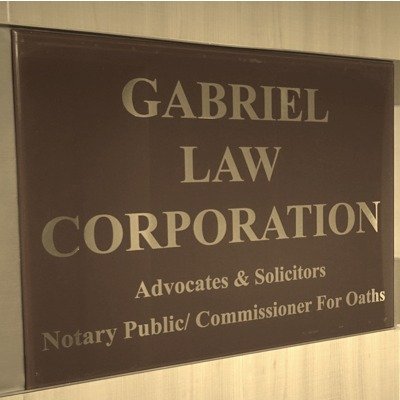Best Restructuring & Insolvency Lawyers in Raffles Place
Share your needs with us, get contacted by law firms.
Free. Takes 2 min.
List of the best lawyers in Raffles Place, Singapore
About Restructuring & Insolvency Law in Raffles Place, Singapore
Raffles Place, situated at the heart of Singapore's Central Business District, is home to many local and international businesses. Given its commercial significance, companies here sometimes encounter financial difficulties requiring either restructuring or insolvency procedures. Restructuring and insolvency law in Singapore is designed to help companies facing financial distress either rehabilitate their business through restructuring or, when necessary, liquidate assets to distribute among creditors fairly. Singapore has established itself as a leading hub for restructuring matters in Asia, offering modern legal frameworks that provide protection and flexibility to both debtors and creditors.
Why You May Need a Lawyer
If your business in Raffles Place is struggling financially or if you are a creditor to a company facing insolvency, engaging a restructuring and insolvency lawyer can be essential. Legal professionals can help navigate complex regulations, assess your options, and safeguard your interests in negotiations or court proceedings. Common situations where legal help is needed include:
- Facing creditor demands or receiving statutory demands for payment
- Needing advice on company voluntary arrangements, judicial management, or schemes of arrangement
- Assistance with cross-border insolvency cases involving assets or creditors in multiple jurisdictions
- Advising directors on their legal duties and potential liabilities during financial distress
- Negotiating with creditors and stakeholders to restructure business debts
- Receiving a winding-up petition or considering filing for liquidation
- Pursuing or defending against claims by liquidators or judicial managers
Local Laws Overview
Singapore’s restructuring and insolvency framework is mainly governed by the Insolvency, Restructuring and Dissolution Act 2018 (IRDA). The legislation covers personal bankruptcy, corporate insolvency, restructuring mechanisms, and cross-border insolvency proceedings. Notably relevant laws and features include:
- Schemes of Arrangement: Court-supervised agreements that allow a company to restructure debts with the approval of creditors.
- Judicial Management: A process where the court appoints a manager to oversee the company with the objective of rehabilitating its business.
- Winding Up (Liquidation): The process of dissolving a company and distributing its assets to satisfy debts.
- Moratorium: Temporary legal protection from creditor actions during restructuring efforts.
- Cross-Border Insolvency: Singapore courts can recognise and cooperate with foreign insolvency proceedings, making it an attractive venue for international cases.
- Director Duties: Directors must remain vigilant in fulfilling their duties, especially when their company is insolvent or near insolvency, to avoid personal liability.
Frequently Asked Questions
What is the difference between restructuring and insolvency?
Restructuring aims to help a business reorganise its debts and operations to return to profitability, whereas insolvency refers to the inability to pay debts as they fall due, which may ultimately lead to liquidation or winding up.
What happens when a company enters judicial management?
A court-appointed judicial manager takes over the company's management, assesses the prospects for rehabilitation, and works towards maximising returns for creditors or recommencing normal company operations when possible.
Can individuals go bankrupt in Singapore, or is restructuring and insolvency law only for companies?
Restructuring and insolvency laws apply to both individuals and companies. For individuals, bankruptcy orders and voluntary arrangements are common mechanisms under local law.
How long does the restructuring process take?
The length of the restructuring process varies. It can range from several months to over a year, depending on the complexity of the case, negotiation dynamics, and court processes.
Are directors personally liable for company debts?
Generally, directors are not personally liable for company debts. However, if they breach their duties, act fraudulently, or trade while insolvent, they may face personal liability or legal consequences.
What protections do companies have during restructuring?
Companies undergoing restructuring may receive court-ordered moratoriums, which temporarily prevent creditor actions such as lawsuits, asset seizures, or winding-up applications, allowing time to reorganise.
How are creditors paid during liquidation?
In liquidation, payment to creditors follows a statutory order of priority. Secured creditors are paid first, followed by preferential creditors (such as employees), unsecured creditors, and finally shareholders if assets remain.
Can foreign creditors participate in Singaporean insolvency proceedings?
Yes, foreign creditors can participate in Singaporean insolvency proceedings. Singapore’s laws also allow recognition of certain foreign insolvency processes, facilitating cross-border recovery for international creditors.
What is a scheme of arrangement?
A scheme of arrangement is a court-approved compromise between a company and its creditors or shareholders, allowing the company to restructure its liabilities with the consent of a majority of stakeholders.
How do I start the winding-up process in Singapore?
The winding-up process can be initiated voluntarily by shareholders or creditors, or compulsorily through a court order. Legal advice is recommended to determine the most appropriate approach and fulfil all procedural requirements.
Additional Resources
For those seeking further assistance or information, the following organisations and bodies in Singapore may be helpful:
- Ministry of Law - Insolvency Office
- Singapore Academy of Law
- Law Society of Singapore
- Singapore Courts and Supreme Court Commercial Division
- Singapore Mediation Centre
- Enterprise Singapore (for business support and guidance)
- Community Justice Centre (for basic legal information and support)
Next Steps
If you or your business are facing financial challenges in Raffles Place or require clarity on your rights and obligations, consider the following steps:
- Assess the financial position of your business honestly and promptly.
- Gather relevant documents such as contracts, loan agreements, and financial statements.
- Contact a qualified restructuring and insolvency lawyer familiar with Singapore law and Raffles Place business dynamics.
- Discuss your options for restructuring, judicial management, schemes of arrangement, or liquidation.
- Act swiftly, as delay can limit your options and increase potential risks for directors and stakeholders.
- Stay informed about your legal duties, especially if you are acting as a director or officer of the company.
Legal advice can make a significant difference in navigating the complexities of restructuring and insolvency. By taking timely and informed action, you can protect your interests and improve the prospects of a favourable outcome.
Lawzana helps you find the best lawyers and law firms in Raffles Place through a curated and pre-screened list of qualified legal professionals. Our platform offers rankings and detailed profiles of attorneys and law firms, allowing you to compare based on practice areas, including Restructuring & Insolvency, experience, and client feedback.
Each profile includes a description of the firm's areas of practice, client reviews, team members and partners, year of establishment, spoken languages, office locations, contact information, social media presence, and any published articles or resources. Most firms on our platform speak English and are experienced in both local and international legal matters.
Get a quote from top-rated law firms in Raffles Place, Singapore — quickly, securely, and without unnecessary hassle.
Disclaimer:
The information provided on this page is for general informational purposes only and does not constitute legal advice. While we strive to ensure the accuracy and relevance of the content, legal information may change over time, and interpretations of the law can vary. You should always consult with a qualified legal professional for advice specific to your situation.
We disclaim all liability for actions taken or not taken based on the content of this page. If you believe any information is incorrect or outdated, please contact us, and we will review and update it where appropriate.











